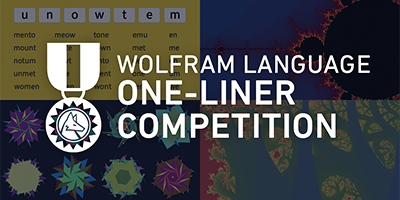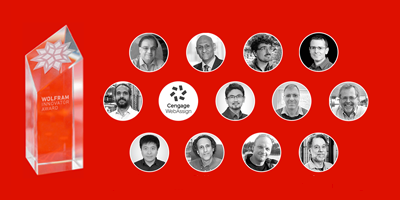Wolfram Technology Conference 2019: It’s a Wrap!
It’s been a whirlwind week of talks, training, workshops, networking and special events, and we’ve just closed another successful Wolfram Technology Conference! The week offered a multitude of opportunities for attendees and internal staff alike to connect, learn and enjoy unique experiences one can only get in Champaign, Illinois, every October. I’m happy to provide some highlights from the week and invite you to save the date to join us next year: October 6–9, 2020.
We began this week with pre-conference training on topics from machine learning and neural networks to application building and “Computational X,” offering headquarters tours and an opening reception before the “real” conference even began. Monday’s opening keynote by CEO Stephen Wolfram covered a ton of ground, from a Version 12 recap to a roadmap of things to come. True to tradition, Stephen uncovered bugs in pre-release versions of our software, livecoded examples and gave the audience so much to look forward to.

Three Decades of Keynotes
This year had our 30th keynote address by Stephen Wolfram. In addition to this three-decade milestone, we had our first livestreamed keynote. Stephen touched on the 12.0 release in April as well as the progress toward 12.1 since then, discussed major accomplishments in the Wolfram Cloud and Wolfram Notebooks, and gave a sneak peek of some fascinating projects to come. Here are some highlights:
- The Wolfram Notebook Archive was introduced as a way to preserve live, interactive computational notebooks in perpetuity, especially in conjunction with the major improvements in cloud notebook publishing.
- Brand-new course content is coming to Wolfram U, including the release of an interactive image processing course to debut next week. Also coming to Wolfram U are integrated course-authoring tools and a new math and science initiative.
- The recent release of Wolfram|Alpha Notebook Edition allows any student to build up and work through computations right inside a Wolfram Notebook, just as they would in Wolfram|Alpha.
- The release of 12.1 in the next few months will include dozens of new functions, as well as higher DPIs for Windows and an increase in workflows crosslinked to other documentation. Additionally, 12.1 will feature a new Standard Notebook toolbar.
- Work toward incremental quality development will be prioritized in order to tackle many lower-level bugs that still exist.
- A Wolfram Citings page will be added to Wolfram Community in order to share the unique creations people are making with Wolfram products. Sharing is also easier than ever with new functionality allowing users to embed notebooks in Community posts.
- A new initiative to find a fundamental theory of physics using computational technology has been launched. A team has been assembled to work toward this goal, and Stephen will be livestreaming his search for the fundamental theory of physics.
… and, of course, much more! So be sure to check out the keynote in its entirety for Stephen’s account of the past year, as well as the path ahead.
Wolfram Innovator Award Winners
Each year at the Wolfram Technology Conference, Stephen recognizes a number of outstanding individuals whose work with the Wolfram Language has been exemplary. Congratulations to the 11 winners of the 2019 Wolfram Innovator Award:

- Thomas Burghardt, PhD, Mayo Clinic Rochester: for the application of neural networks constructed with machine intelligence tools in the study of inheritable heart disease.
- Todd Feitelson, Millbrook School: for innovative educational techniques utilizing computational thinking and 3D printing in high-school classrooms.
- Chris Hanusa, PhD, CUNY Queens College: for creating tools to advance the visualization of concepts in the classroom through computational technology.
- Joo-Haeng Lee, PhD, Electronics and Telecommunications Research Institute: for developing a unique and powerful pixel-based color transition algorithm (PixelSwap) and his work in synthetic learning sets.
- Casey Mulligan, PhD, University of Chicago, Former Chief Economist for the White House Council of Economic Advisers: for his innovative work on automated economic reasoning, which can begin with purely qualitative assumptions.
- Flip Phillips, PhD, Skidmore College: for his work on the visual and haptic perception of two- and three-dimensional shapes, psychological aesthetics and cortical plasticity related to blindness and visual restoration.
- Robert Rasmussen, PhD, and William “Kirk” Reinholtz, NASA Jet Propulsion Laboratory: for optimizing the integration of mission operation systems and preserving consistent and accountable information throughout the operations processes.
- Jane Shen-Gunther, MD, Colonel, US Army, Brooke Army Medical Center: for automating data processing for DNA sequencing in gynecological oncology and HPV detection and integrating interactive visualizations into reporting structures.
- Yehuda Ben-Shimol, PhD, Ben-Gurion University of the Negev: for introducing thousands of students and fellow faculty to the use of computational thinking in communications systems engineering as well as contributions to the advancement of earthquake prediction.
- Mihai Vidrighin, PhD, PsiQuantum: for building comprehensive models of nonlinear and quantum optics to describe spontaneous parametric photon-pair generation and quantum optics circuits.
Crowning Our Livecoding Champion
On Wednesday night, we held our annual Wolfram Livecoding Championship, a favorite special event now in its fourth year. Conference guests and internal enthusiasts alike competed to most accurately and most quickly answer seven Wolfram Language programming questions. This year, all contestants who earned at least a point on the questions were eligible for prizes, in addition to our first-, second- and third-place winners. Questions included:
- Which 10 people have the most Wolfram Language symbols named after them (eponyms)? Return the most common country of birth among them as a country entity.
- Evolve the rule 30 cellular automaton for 2,000 steps starting from a single 1 centered on a background of 0s.
- Given the string “4 – 2 + 3 + 4”, find all the parenthetical groupings of exactly two subexpressions at a time for which the final expression evaluates to a positive number.
Dubbed the “Chip and Flip Show,” the competition was hosted by our high-energy emcees, Chip Hurst and Flip Phillips, who kept the live audience engaged and laughing. We had an incredible first-place finish by Gerli Jogeva! She brought home the win with a commanding 14 points.

Rounding out the top three place finishers, Carlo Barbieri and Sander Huisman came in second and third. Congratulations to our winners, and thank you to all who participated in making this another impressive and truly fun year of livecoding!

If you didn’t catch the championship live, you can relive the excitement and creativity in our archived livestream video of the event.
So Much More…
Throughout the conference, our senior developers stopped by our Tech Talk booth to chat about what projects they’re excited about and what their teams are working hard on. We had a student poster session, demo booths for hands-on engagement, an expert panel, topical meet-ups and roundtables, another iteration of the infamous One-Liner Competition and so much more.
See You Next Year!
And that’s the end of the 2019 Wolfram Technology Conference. We want to thank all our presenters and attendees, because you are the ones who make our incredible community what it is. If you couldn’t make it out this year, we hope you’ve enjoyed the livestreamed portions of the conference—keep an eye out for all the archived videos coming soon to the Wolfram YouTube channel. We can’t wait to see what awaits us next year!
| Mark your calendars now and save the date for our next Wolfram Technology Conference, October 6–9, 2020! |



The link to the keynote video does not work. I get the video is “private”
Thanks for bringing this to our attention. The link is now available to view the coding competition.